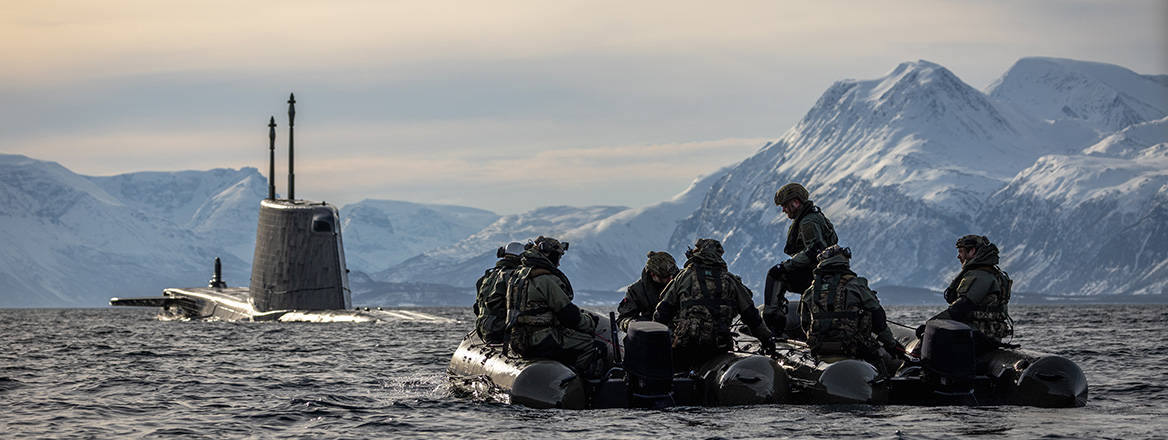Frozen Out: Why the UK Must Step Up in the Arctic
The Arctic is set to be a proving ground for the navies of the High North. As warmer temperatures open up shipping routes for longer each year, great resources are at stake, and a determination to exert control is growing evident among the UK’s neighbours in the region.
The Arctic is no longer a distant afterthought for global security, it is a frontline. As ice recedes, new shipping routes, untapped resources, and rising military activity are transforming the region into a potential geopolitical flashpoint. The UK, despite branding itself as the ‘Arctic’s nearest neighbour’, risks becoming a spectator in a contest that directly impacts its security and economic resilience. If Britain wants to secure its place as a key actor in the High North, it needs to move beyond gestures and deliver real strategic action.
The Arctic’s New Reality
The Arctic is heating up both literally and geopolitically. Russia has reopened and modernized its Cold War-era Arctic bases and deployed advanced missile systems to secure its Northern Sea Route. At the 2023 Arctic Circle Assembly, the Chair of the NATO Military Committee, Admiral Rob Bauer, warned that the Arctic was a Russian stronghold, leaving Europe’s northern flank dangerously exposed in any potential conflict. Russia itself has warned that it is fully prepared for a war with NATO in the Arctic.
China, too, has carved out a growing Arctic role, investing heavily in infrastructure under the banner of its “Polar Silk Road.” Whilst it does not have a permanent military presence, it is still clear that Beijing is not approaching the Arctic with just scientific cooperation in mind. The deployment of research vessels equipped with dual-use technology and the push for Arctic shipping dominance signals a long-term play for influence in the region’s future that could hold strategic military benefits.
If Russia’s Northern Fleet were to tighten control over the Greenland-Iceland-UK (GIUK) Gap, the Royal Navy would face a strategic chokepoint that could sever transatlantic supply lines
In sharp contrast, the UK’s Arctic strategy, updated in 2023, remains cautious. It focuses on diplomatic engagement, climate research, and intermittent military exercises. Whilst these are important to state security, they are insufficient in a region where hard power and persistent presence are increasingly dictating influence.
Why the UK Cannot Sit This One Out
The trajectory of Arctic security is not a distant concern for Britain – it is a direct vulnerability. If Russia’s Northern Fleet were to tighten control over the Greenland-Iceland-UK (GIUK) Gap, the Royal Navy would face a strategic chokepoint that could sever transatlantic supply lines. This is not just a hypothetical risk: the Royal Navy has confirmed increased Russian naval patrols near UK waters, underscoring the Arctic’s role as a gateway to the UK itself.
Economically, the Arctic shipping routes that emerge from melting ice, like the Northern Sea Route, could slash travel times between Asia and Europe by up to 40%. If China or Russia were to dominate these corridors, British trade would face a long-term competitive disadvantage. Energy security is also at stake. With Europe also weaning off Russian gas, the Arctic’s untapped reserves are a lifeline, but only if the region remains accessible.
A Strategy for Influence, Not Just Presence
The UK needs to recalibrate its Arctic strategy, shifting from symbolic engagement to operational security relevance. This does not mean overextension or replicating Norway’s footprint in the High North, but it does require targeted moves to secure Britain’s influence.
To start, the UK needs a permanent maritime presence: rotational deployments are no longer enough in today’s geopolitical landscape. The Royal Navy should establish year-round, Arctic-ready patrol capabilities- not only to support NATO partners but to ensure Britain’s own freedom of navigation. The upcoming Type 31 frigates, designed for deterrence and global reach, could play a pivotal role here.
The UK should also push to lead a NATO operational command focused on the North Atlantic and High North. Denmark and Canada, key Arctic players, have already strengthened their regional command structures and Britain should not lag behind its allies. An Arctic command and control hub would ensure that the UK is fully prepared to defend key maritime areas from Russia’s Arctic fleet, such as the Greenland, Iceland, and UK gap.
Strategic infrastructure investment: Beyond defence, the UK must position itself as a leader in Arctic economic infrastructure. This means investing in dual-use ports and maritime hubs capable of supporting both commercial shipping and naval logistics – particularly as Arctic routes become more viable.
A Secure Future for the Arctic, and the UK
A tailored Arctic strategy has provided a solid base through which the UK can engage with non-military Arctic activities, but the High North is not a region where goodwill and soft power alone carry optimum weight.
Britain must make itself indispensable to Arctic security, not just for NATO, but for its own national interest. If it fails to act on this, the Arctic’s emerging and established powers will not wait for permission to shape the region’s future. If Britain is a maritime nation with global ambitions, the Arctic is fast becoming a stage where those ambitions will be tested and the UK can’t afford to watch on.
© Anthony Heron, 2025, published by RUSI with permission of the author.
The views expressed in this Commentary are the author's, and do not represent those of RUSI or any other institution.
For terms of use, see Website Terms and Conditions of Use.
Have an idea for a Commentary you'd like to write for us? Send a short pitch to commentaries@rusi.org and we'll get back to you if it fits into our research interests. View full guidelines for contributors.
WRITTEN BY
Anthony Heron
Guest Contributor
- Jim McLeanMedia Relations Manager+44 (0)7917 373 069JimMc@rusi.org



